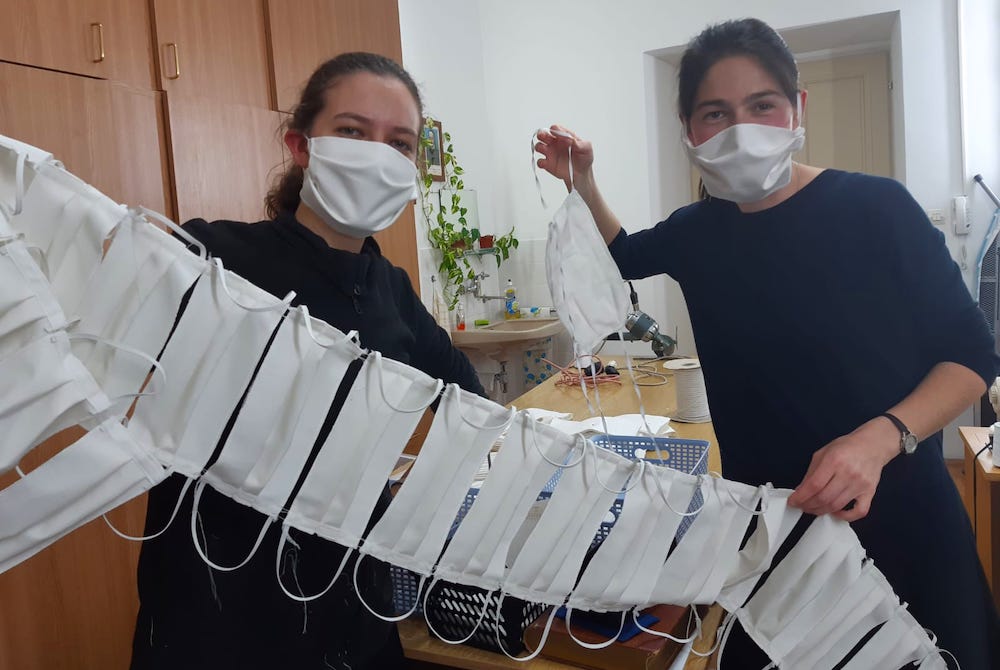
Candidates of Sisters of Mercy of the Holy Cross in Djakovo, Croatia, show a string of masks they have sewn to share with the people in the communities they serve. (Sr. Valerija Široki)
Editor's note: As part of our Coronavirus: One Year Later coverage, we invited leaders of women's congregational associations to reflect on how the pandemic has affected religious life in their regions. Some provided overviews; others focused on their individual congregations as emblematic of shared experience. This entry is from the Croatian Conference of Religious.
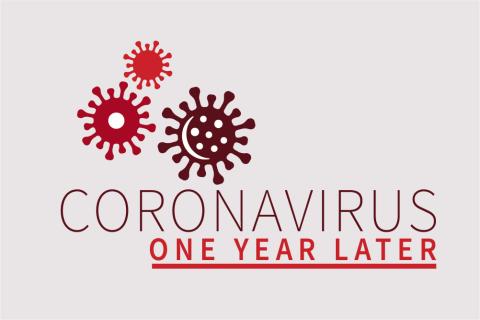
(NCR, GSR logo/Toni-Ann Ortiz)
COVID-19 and the preventive measures that the whole world has been facing for a year now have also affected Croatia and its religious communities. Apostolic communities were affected more than cloistered ones. In total, there were 417 COVID-19 infected patients with severe symptoms, 159 patients who tested positive but without symptoms, 992 persons who had to self-isolate (they tested negative but had contact with someone who had tested positive), and eight who died of COVID-19 in Croatian religious communities, according to data compiled by the Croatian Conference of Religious from March 15 to Nov. 15, 2020.
Larger communities, especially those with 30 or more people, recorded more cases of infection. The majority of women religious individual communities have five or fewer members, while about 28% have 15 to 30 sisters and about 3.7% have more than 30 members. The COVID-19 pandemic hit the largest female religious community the hardest, with 177 cases of infection — four of the sisters died.
Congregations also described the impact of the COVID-19 pandemic on their pastoral ministries and communities in the survey by the Croatian Conference of Religious. Women religious minister in parishes, educational institutions (schools, kindergartens) and in health and social-charitable institutions.
COVID-19 did not significantly influence the initiation of new ministries. A few religious communities introduced the possibility of counseling over the phone and listening to people in need of spiritual and psychological support. Some communities sewed face masks and shared them for free. Younger members of the communities helped by sharing meals and procuring medicines for the elderly who were advised by the National Civil Protection Headquarters not to leave their homes.
Women religious who recovered from COVID-19, having acquired some immunity, helped care for the elderly in assisted living facilities. The superiors of religious communities emphasized that there was a greater presence of men and women religious on social networks: Eucharistic celebrations were broadcast online, and there was online catechesis and online teaching in schools and colleges.
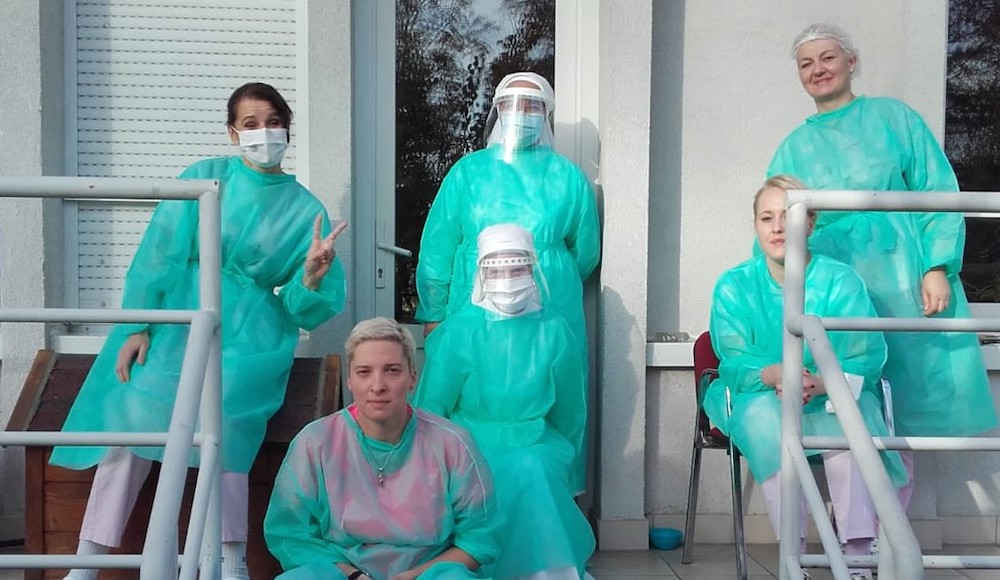
Two Sisters of Mercy of the Holy Cross, center, who recovered from COVID-19 and acquired some immunity, went to help with the care for the elderly in assisted living facilities in Zagreb, Croatia. (Croatian Conference of Religious)
The transfer of the apostolate to the virtual world had some positive aspects, including encouraging congregations to invest more in creating a digital presence. But it also has had some negative consequences. In the words of one superior in November:
Every apostolate [in person] has been reduced. Every form of worship has been made more difficult. Pastoral activities are very limited, especially catechesis and care for the sick. All pastoral activities, except for the Holy Mass, have been hindered due to too little or no response. The quality of the pastoral ministry of the sacraments has been diminished as teaching and meeting in person became impossible. The number of believers at the Holy Mass has been drastically reduced. Due to all of the above, our community reports a serious decline in financial revenues, and we are concerned about further subsistence.
COVID-19 affected not only external activities but also internal life of communities. The superiors note:
The COVID-19 pandemic ... has intensified communication via social networks, but it has also awoken the fear of close communication and distanced people from each other. It is necessary to restore trust in people and reduce the fear of the coronavirus.
Other comments by superiors indicate other effects. When it comes to the apostolate:
we did not abolish anything, but we did adapt. ... We spent less time outside the monastery, and more together. We did not travel outside the country.
When everything was in lockdown, we connected in a different way, using modern means of communication to contact each other, to learn, to ask each other how we were. ... Our life is apostolate, so we tried to live it as authentically as possible.
We did not hold some meetings this year, we just postponed them, so I believe we will appreciate them even more when we have them again.
Advertisement
We have seen that lots of things are not dependent on our plans, that there is a bigger plan and that modern analyses and data do not help us much.
In religious communities, opinions on the dangers of COVID-19 and the accompanying measures introduced by the Civil Protection Headquarters differ, as is the case with the general public:
We questioned and discussed our own trust in those who lead our society and the state, the profession, the people who have learned something and know something.
In another community:
COVID-19 did not have any special influence on us in terms of apostolate. We did not ban people/believers who wanted to come to our community from coming because we were not afraid of COVID-19, and we are still not afraid of it. Everything comes from God. He gives and takes. Even when it comes to health.
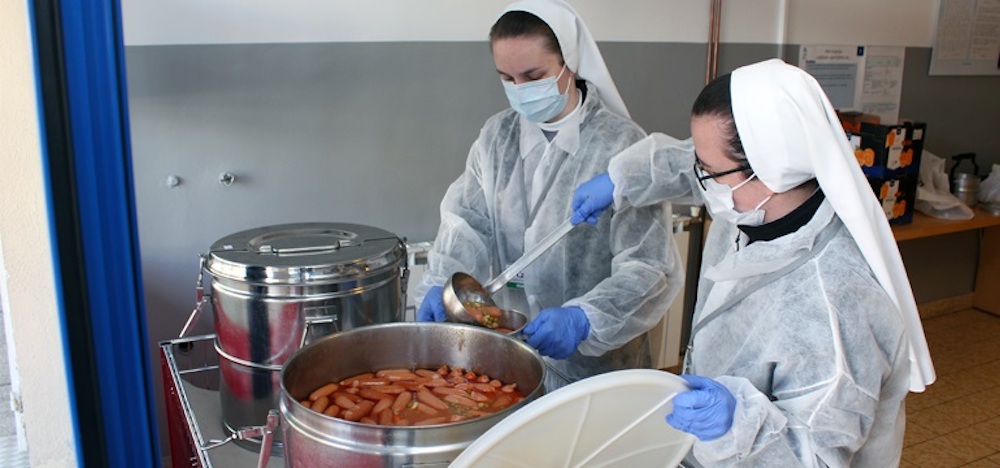
Sisters of Mercy of the Holy Cross in Zagreb, Croatia, prepare food for older people who are in isolation because of the pandemic. (Sr. Marija Karla Ivanović)
Although a great number of communities introduced more personal and communal prayers, as well as eucharistic adorations, most superiors expressed their grief over the lack of sacramental life:
Unfortunately, due to COVID-19, we did not carry out holy rites and the Eucharist during the Holy Week and on Easter, and that was very difficult for us. We pray to the living God and hope that something like this will never happen again in the future for any reason such as ... COVID-19.
With the lack of sacramental life, special attention should be paid to those who had to be in self-isolation (some up to five or six times for a period of two weeks) for several months, practically without the sacraments and outside the community.
In addition to COVID-19, Croatia was faced with another challenge — earthquakes. The country suffered two major earthquakes in 2020 — on March 22 in Zagreb, which measured 5.5 on the Richter magnitude scale; and Dec. 29 in Sisak, with a magnitude of 6.4. Coatia has had hundreds of weaker ones for months. Many churches and monasteries were demolished or damaged. No one was injured or killed, but at least four congregations have had to move to other living quarters, and three suffered damage to their kindergarten facilities, which is a main source of income. As they work to rebuild, religious communities try to live in the hope of emerging from the pandemic isolation by relying on the One who holds the universe and hearts of people in his hand.
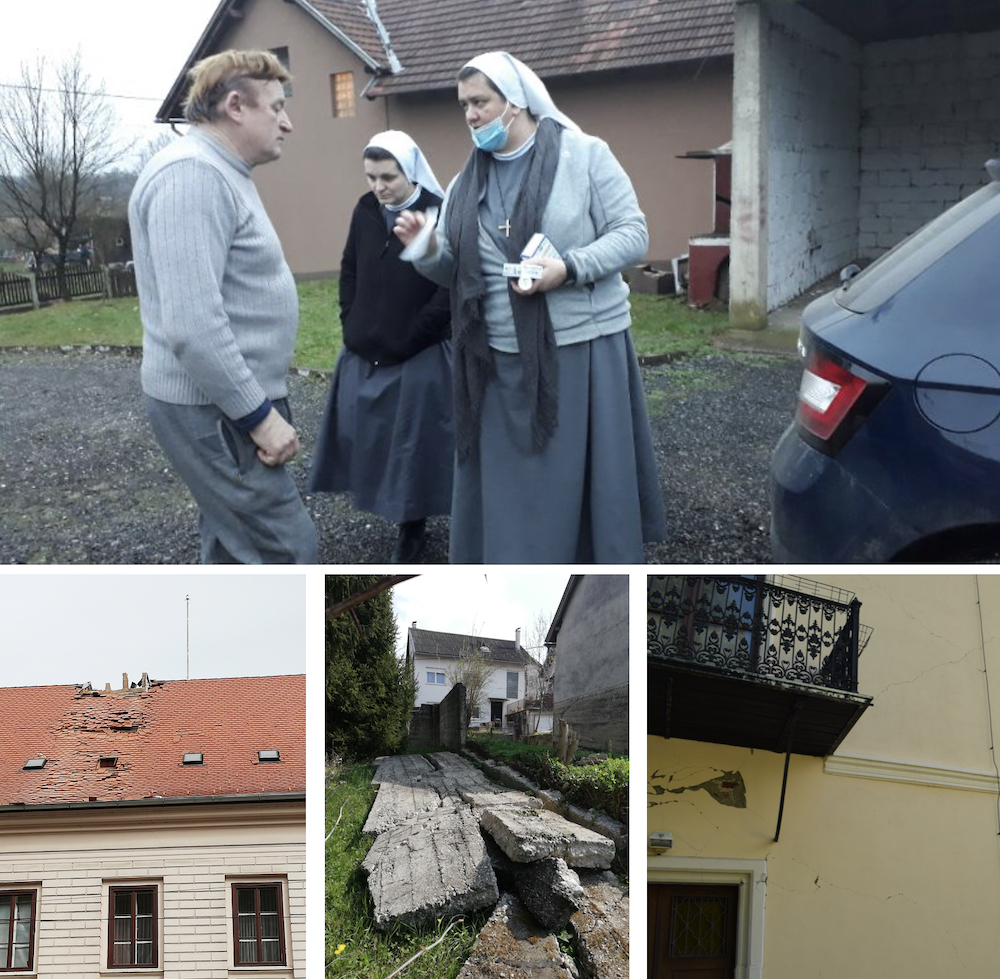
Top: Sisters of Mercy of the Holy Cross bring medicines to people who are isolated by the pandemic and also recovering from the Dec. 29, 2020, earthquake in Sisak, Croatia. (Sr. Mirjam Jerković) Bottom, from left to right: Convents in Zagreb, Croatia, were damaged in the March 22, 2020, earthquake, including those of the Ursuline Sisters of Roman Union (Sr. Ksenija Leko), the Sisters of St. Claire (Sr. Marija Ivana Dolinar) and the Sisters Servants of the Infant Jesus (Sr. Marija Banić)






